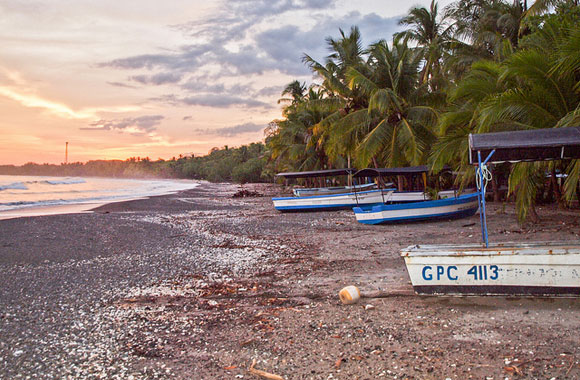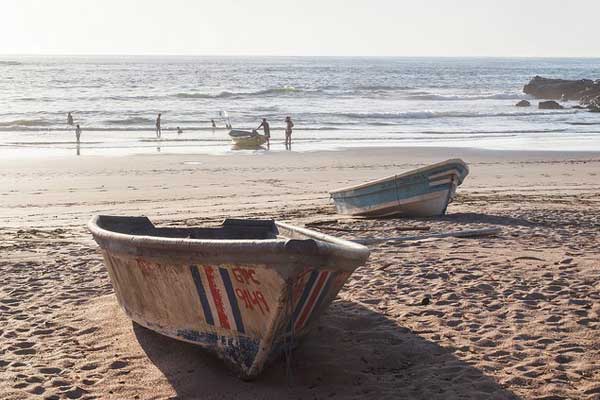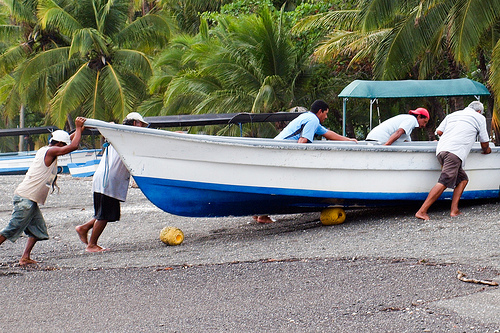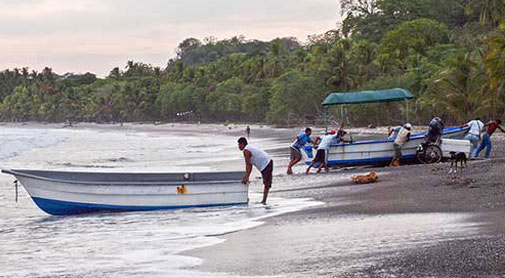3 Expat Stories from Samara, Costa Rica
The Costa Rica Beach Town That Tropical Dreams Are Made Of
By
Town is quiet in the morning; a few local vendors set up roadside shops where they sell wood carvings, tapestries, and the like. A few people gather for a generous breakfast and fresh-brewed, local coffee for about $8 at the cafés. “Downtown” is small, really just one street that wraps around the western shoreline…walk through from the road and you’ll be in awe of the three-mile stretch of lush, palm-lined coast and blue water. An old fisherman’s boat is always washed up during low tide.
My husband plays in the Association of Beach Volleyball Costa Rica National Open and we’ve traveled to Playa Samara, on Costa Rica’s Pacific Coast, a few times for tournaments, and each time I love this sleepy beach town a little more.
Signs for businesses here are mostly hand painted and wooden. While there are a few businesses owned by expats, bringing cultural influence from elsewhere, Samara is widely known for harnessing and preserving authentic, Tico culture. With no large resorts, you’ll find an eclectic and somewhat bohemian mix of boutique hotels and lodges, restaurants, and cafés.
Costa Rica in general is hailed for its friendly people, but Playa Samara embodies this reputation to its fullest. People will stop you on the beach to chat and they’re interested in your story; I always leave Playa Samara with new friends.
Perhaps one of the largest draws for expats to Samara is the Costa Rica School of Massage Therapy, the world’s premier study abroad program for Massage Therapy Certification. It draws both young professionals and those looking for a gratifying and peaceful second career. And do you know what this means for visitors and locals alike in Samara? Incredible massages at an affordable price at the school’s tranquil massage center; on average they offer massages at varying lengths, up to 90 minutes for just $1 per minute.

Small organic markets selling everything from fresh produce to chocolate and herbs and spices are plentiful here, as well as yoga and practitioners specializing in holistic healing. While the town itself is fairly small, Samara’s residential community stretches out into the countryside and up into the hills, which abounds with wildlife, and overlook the crystal-blue waters.
The shape of the cove and reef that’s just offshore cause the waves to break before they reach shore, making swimming conditions here relatively calm and warm. You can surf occasionally, but this beach is more suited for relaxation than sport. While there are beachfront hotels and a couple of restaurants, the majority are tucked away so as not to obstruct the natural beauty of the beach. And locals often ride horseback along the water, some offering rides to tourists, but some simply enjoying the serenity of gentle waves and salty air.
To satisfy my own curiosity I did a little research and found a simple one-bedroom apartment, fully furnished, with utilities included, available to rent for $700 per month. I also found a three-bedroom luxury villa, fully furnished with immaculate landscaped gardens, and an ocean view for rent for $1,500 per month.
Samara is far enough off the beaten path to feel like you’ve entered a different reality, but still accessible via a paved road to both the international airport in Liberia and necessities like banks and hospitals about 23 miles away in Nicoya.
During all my years living through Michigan and Illinois winters, daydreaming of tropical getaways, I now know it was a beach town just like Playa Samara I was longing for.

Get Your Free Costa Rica Report Here:
Learn more about Costa Rica and other countries in our daily postcard e-letter. Simply enter your email address below and we'll send you a FREE REPORT – Costa Rica: The Land of Pura Vida
This special guide covers real estate, retirement and more in Costa Rica and is yours free when you sign up for our IL postcards below.
We Never Worry About Money or the Cold in Sámara, Costa Rica
By Cheryl Potter
Fresh fruits and vegetables year-round; the best coffee ever; unspoiled, deserted beaches; stunning mountain vistas; lush jungle; and the friendliest people on the planet. We didn’t think we’d ever live such a life, but in Costa Rica, we found it easily.
The western shore of the Guanacaste Peninsula, where we now live, is filled with tiny tourist towns like ours, where you can buy fresh seafood, fruit, and vegetables at the soccer pitch “downtown” daily. Sometimes we go to the docks to pick out fresh fish as it comes off the boat, and we get a preview of what the local restaurants will be serving that night for dinner.
It’s such fun walking the beach in the evening, before choosing an outdoor restaurant on the sand with live music, where a rock lobster dinner for two comes with a glass of wine or beer for just $25. We enjoy fresh red snapper, jumbo shrimp, and tuna regularly. And my husband, Tim, loves to make smoothies from just-picked mango, pineapple, and passion fruit purchased hours earlier for less than $1.
It’s our slice of paradise, but our life wasn’t always like this. For decades we lived in rural Vermont, in the cold but breathtakingly beautiful mountains of the Northeast Kingdom.
Tim was a dairy farmer who actually broke his neck after working 80 hours a week for over 20 years. I worked in real estate until my first knitting book was published and I started my own online yarn company. Then I blew out my knee while working with one of our draft horses, and I needed surgery.

As winter set in, we did not even have enough firewood stacked ahead to heat our large, drafty farmhouse. My husband had a steel plate in his neck and I had a bum knee. We were only approaching our early 50s, more than 10 years from retirement. I had a portable income as a writer and owner of an online company. Tim managed our farm and rentals. But winter is a slow time in farming—it could manage without him for a while. Could we consider uprooting ourselves to scout out a more temperate climate?
We knew we needed a change, but at that time we had no idea that we would end up living Pura Vida—the good life—in Costa Rica, with no snow ever and on a fraction of our budget.
We bought tickets, flew to San José, and rented a small four-wheel-drive vehicle so we could wander all over, seeking someplace that called to us. We found it in a small-town expat enclave in the Guanacaste region. That settled it: We wanted to live there. We went back to Vermont, and, bit by bit, started selling used farm equipment. We leased our cropland, too. And a year and a half later, we went back to Costa Rica with some funds and a purpose.
The beach community of Sámara is perfect for us, with a strong U.S. and Canadian presence and Australian, German, and Italian mixed into the tico culture. We favor an Australian sports bar called Outback, where everyone speaks some sort of English, plus it rents ATVs. There is also a well-known yoga school and community college where you can take Spanish and English language classes. At dusk, students stroll the beach, savoring the last rays of sunset. From the beginning, we had an easy time communicating without speaking much Spanish, although we find we’re picking it up quickly. There is a special dialect around the Peninsula. People throw words like “cool” and “gesundheit” into their Spanish.
Best of all, we never worry about money or the cold. We can easily manage on $2,500 a month, including gas, electricity, water, and taxes. We even have a weekly pool guy and housekeeper.
Do we miss Vermont? Of course we do, but we have not abandoned it. It’s only a plane journey away, after all, and we can travel in off-peak times to save on tickets. We still own our business and still go back in summer to see friends and take advantage of the alpine lakes near our old farm up north.
Cost of Living in Samara: From Rock ‘n’ Roll to Relaxing by the Beach for $1,750 a Month
By Ellen Zoe Golden
I was a publicist in the entertainment industry back in New York for nearly 30 years. It was hectic, and rewarding, but I was very stressed. On a vacation to Tamarindo, Costa Rica I met a bunch of people from around the world who had swapped busy lives for a more peaceful existence at the beach. And I loved the Costa Rican people—Ticos they call themselves. After four more visits that year I moved to this beautiful town in the national park on the Pacific Ocean.
When I first moved to Tamarindo, it was an up-and-coming fishing village that drew surfers from around the world. I had to go an hour away by car service to find an ATM or a decent supermarket. Now, it’s a popular beach town with great infrastructure including supermarkets, banks, cable, internet, pharmacies, more than 30 restaurants, tour companies, and shops. And, should the mood take me, I can drive my car 45 minutes to Liberia, where there’s a movie theater now with movies in English (and Spanish subtitles). I speak a patched-together Spanish which is extremely useful in this Latin American country.
In the beginning, I was reluctant to give up the “big life” and for many years still worked with entertainment clients in the U.S. from Tamarindo, first at my place in a hotel where I could have a telephone and dial-up internet, then later from my own home—outfitted with my own telephone and cable internet. Yet, half-days in front of the computer, followed by cellphone conversations at the beach, were still fueling my Type-A personality, so I finally gave that up and retired.
I moved into a room at Tamarindo’s Best Western, and spend about $1,750 on my living expenses a month. This includes rent, food, yoga, and small getaways. I find that a visit to the large Auto Mercado supermarket can run close to $150 a week, and dinners out at the myriad of restaurants in town can range from $10 to $25 per person for a meal, not including drinks.

It is possible to live on a smaller budget, however, if I seek out the typical Costa Rican restaurants—called sodas—and limit my purchases each month. It helps that Saturdays there is a local farmers’ market, where people come from all over the country to sell vegetables, breads, cheeses, sausage, meats, dairy products, jewelry, and clothes. I’m there like clockwork at 10 a.m. to pick up my homemade bagels from the couple who drive up from Samara, and my vegetables from the local farmers. I signed up for the public healthcare system, the Caja, and for less than $40 a month, I get all my care and medicine for free under this service.
I love getting up early and running on the beach, which lines a big bay where sport-fishing boats and catamarans that offer sunset snorkeling tours are moored. I am not a great surfer, but I love paddling into the waves here in the bay or across the estuary to Playa Casitas.
Usually, two or three nights a week I do yoga at Ser Om Shanti in town, where the angelic (and very experienced) Mariel Marmorato guides us through our practice. The rest of the week, I enjoy a spectacular palette of colors as the sun sets over the ocean. Sunsets are an incredible social time here in Tamarindo, as people gather to bask in the last light and catch up on the day’s news from other friends who have had relaxing days.
A lot of people who visit Tamarindo, or read about it on the internet, think of moving here because they too want to have a peaceful life living in nature. My advice is always the same: Spend some time here first, because living in Costa Rica is not the same as visiting. Ticos do things their own way, and it may be frustrating or jarring to move at this slower pace. Patience, or Pura Vida (Pure Life), is a necessity.
For me, these days I cherish my peace-of-mind and my simple life. I still listen to a lot of music, but now it’s entirely for fun and enjoyment. The friendships I’ve made in this country are so valuable, and I’m sure they will last a lifetime. I’m healthy and happy, and that’s all I’ve ever wanted.
8 Best Things to Do in Playa Samara, Costa Rica
By Nickola Johnson
Playa Samara is an often-overlooked gem nestled in the Guanacaste Province of the famous “Blue Zone.” (A Blue Zone is a region of the world where people reputedly live longer than average.) It is not as popular as the other beaches along the coast such as Playa Tamarindo and Playa Del Coco but that’s what makes it unique and distinct.
It sets itself apart from any other place with a perfect blend of locals and foreigners for a cultural explosion. The local residents have managed to keep this small yet special town undisturbed with an amazing four-mile stretch of beach and dirt roads.
There are also few franchises. Nearly everything is local except for a supermarket called Pali, owned by Walmart. This is something I appreciate because I prefer to support the locals in their small communities. They work so hard to make a living.
Here is a list of the exciting things you can do in Playa Samara:
1. Outdoor Activities
Firstly, the weather in Samara is beautiful. There are two seasons, rainy and dry. The best weather is from November until April. If you love basking in the hot weather that is the best time to visit.
There are so many water activities to do such as kayaking, snorkeling, deep sea fishing, deep sea diving, paddle boarding, horseback riding, dolphin watching, and hiking. There are a variety of amazing outdoor activities to choose from. The Samara Info Center is very helpful if you need any information about booking tours or have any queries.
2. Playa Samara
Another wonderful thing about Samara is that there are four beaches in a two-mile radius. Playa Izquierda, Playa Buenavista, Playa Carrillo, and Playa Barrigona.
Samara Beach is one of the most beautiful and peaceful beaches. You have all the space in the world to walk, run, enjoy all the water activities, have some food, enjoy happy hour, you name it.
3. Surf
The Guanacaste region is a surfing paradise. There are many surfing school options in Samara where you can take lessons. In addition, the four beaches I mentioned above are all prime surf spots. I recommend beginners start at Playa Samara but if you are a surf junkie looking for some more adventure nearby Playa Izquierda and Playa Barrigona, or Playa Guiones in Nosara are great spots.
4. Catarata Belen
This beautiful waterfall is located about 20 minutes outside of Samara. It is about one mile inland from the main road. It is a beautiful local spot to spend a few hours and relax and enjoy the Pura Vida (literally Pure Life, a way of life for Costa Ricans) of the Guanacaste energy.
You can take the bus but make sure to tell the driver you want to get off at Catarata Belen. Then you can walk the mile inland. Otherwise you can take a taxi or a rental car.
5. Sunrises and Sunsets
If you have a soft spot for amazing sunrises and sunsets, then you landed the perfect place. The sunrises and sunsets are out of this world. There is no better way to start and end your day than watch a golden sun rise (or dip) from the horizon.
The energy on Samara Beach is very healing and liberating. Take a stroll or sip on a cocktail and just enjoy the beauty that surrounds this place.
6. Isla Chora
Isla Chora is a pretty little island facing Samara Beach. You can kayak the length, and it will take about 25 to 45 minutes depending on the tide.
It is a beautiful spot with amazing views of the mountains that surround Samara Beach. If you are adventurous and a good swimmer you can even swim across the water to the island when it is low tide. It is a nice island to enjoy the Pura Vida and have a little picnic.
7. Playa Izquierda and Playa Buenavista
These beautiful beaches are about a 15-minute walk from Samara Beach. They are perfect spots for surfing or just relaxing.
There is a 15-minute hike to get down to Playa Izquierda. The views are breathtaking. On the walk you can see many butterflies and animals. These beaches are more secluded which makes it so much more authentic and local.
8. Werner Sauter Biological Reserve
This is another beautiful hike where you will learn about the natural and cultural features that make the Guanacaste region a “Blue Zone.” Enjoy the unique and amazing animals and enjoy basking in the beautiful nature Samara has to offer.
Conclusion
Travel really is the only thing you can buy that does make you richer. And that is how Samara will make you feel. You will feel richer in your experiences and most importantly in yourself. It’s a small town that will always hold a special place in your heart and that will change your life.

